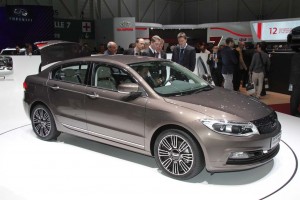It’s the world’s biggest car market, yet, when it comes to fully-assembled automotive exports, China is little more than a minor player. But a new and unusual consortium pairing one of the Asian nation’s more ambitious domestic makers with an Israeli billionaire hopes to convince buyers around the world that Chinese cars don’t have to be cheap, shoddy and unsafe.
The product of a 50/50 joint venture between Chery Automobile and Idan Ofer’s Israel Corp., Shanghai-based Qoros Auto Co., Ltd. Made a splashy debut at this month’s Geneva Motor Show with a trio of concept vehicles it has spent the last five years pulling together.
While Chery is one of China’s largest homegrown brands, the partners decided to reach outside for help in crafting a product line-up that could compete on a global scale. That was a costly but potentially significant decision considering that the current crop of domestic Chinese products don’t stack up well against the offerings of the established automotive order, whether from Honda, Hyundai, Chevrolet or Volkswagen.
Among the “internationally renowned suppliers” Qoros has turned to are Magna Steyr, TRW, Continental, Bosch, Getrag, Benteler, Lear, Microsoft, and Harman.
“Nobody expects a Chinese company to be able to deliver this quality,” says Ofer, Israel’s wealthiest man, surveying the Qoros booth at Geneva’s PALExpo convention center. And that, he contends, will permit the start-up to become a serious player on a global stage.
His Israel Corp. has so far put up about $300 million in cash, a figure matched by Chery. They’ve also signed on for enough debt to give the Qoros a $2.7 billion war chest. In most industries that might appear a vast sum, though it pales when one considers what Western and Asian competitors are coughing up. Audi CEO Rupert Stadler this week announced plans to invest $14 billion by 2015 to update the maker’s admittedly much larger product line-up.
The new Chinese maker is starting a lot smaller, its compact Qoros 3 expected to be offered in a variety of body styles and with a mix of powertrains that will likely include the hybrid drive shown in Geneva.
The Qoros stand has drawn large crowds, including plenty of engineers from competing automakers looking to see what the Chinese start-up has accomplished. The general response has been positive, the three prototypes showing a level of refinement and quality that hasn’t been seen with previous domestic Chinese offerings.
Of course, it’s one thing to carefully hand-finish a concept vehicle, another to repeat that process when 60 vehicles are rolling down an assembly line every hour.
“The market will decide” whether Qoros can pull it off, says Ofer, clearly confident in his venture.
The test will come soon, the new maker planning to launch volume production of the Qoros 3 sedan by the end of 2013, with exports to Europe scheduled to follow within a year. As for the crossover, hybrid and other vehicles reportedly under development, a company release promises, “The launch of further Qoros models is then planned at intervals of approximately six months.”
Among the products that could follow, Qoros is looking at a pure battery-electric model of the 3 sedan. It may have no choice. As TheDetroitBureau.com recently reported, Chinese regulators are struggling to find ways to curb the nation’s endemic – and worsening – air pollution problem, especially after recent spurts of record smog levels in the capital Beijing. One possible solution would be to mandate a major shift from gas to electric propulsion.
“We’re ready to accommodate any new regulations,” says Ofer, asserting that, “The people of China are moving to electric mobility. Full Stop.”
Significantly, the hybrid version of the Qoros 3 was initially designed not only to adapt to a full battery-electric driveline but to adopt the battery-swapping approach pioneered in Israel by the visionary Project Better Place. No surprise, however, as Ofer recently took a controlling stake in the struggling venture.
There is little doubt that Qoros has plenty of challenges ahead of it. Domestic makers like Chery control a relatively modest stake of the Chinese market – which is dominated by foreign brands such as General Motors, Volkswagen and Toyota. But when asked if he believes Qoros can gain a reasonable share of the fast-growing market, bristles at the word, “if,” and suggests, “Let’s change that to when.”
He clearly is looking to get a payback for his investment in the firm, but he stresses that he traditionally doesn’t expect to begin seeing returns on his industrial investments for at least seven years, so there’s a bit of time left.
As to longer-term plans, the question obviously turns to the United States. Over the past decade, a number of Chinese makers have laid out ambitious plans, BYD even setting up an office in Los Angeles, but so far, they’ve failed to establish a retail presence.
For his part, Ofer says the U.S. market is “secondary” to the roll-out plans for Qoros. But before moving on to another meeting, he pauses to re-think that comment. “I shouldn’t say anything that you’ll remind me of in the future if I change my mind.


China is good at making low cost, low quality look-a-like products. That’s enough for many technically challenged people.